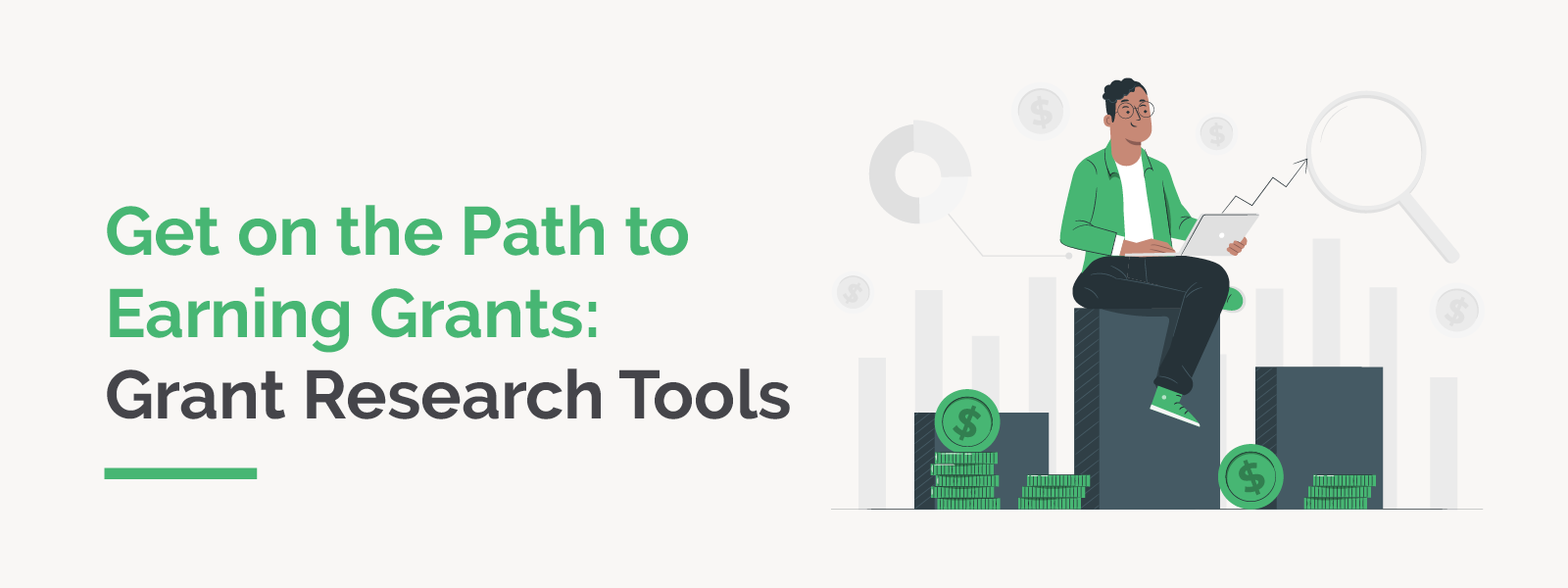Get on the Path to Earning Grants: 10 Grant Research Tools
From recurring donors to annual fundraisers to merchandise sales, the more income streams your nonprofit has, the more financially secure your organization will be. The key source of revenue that can bring in reliable funding year after year is grants.
Grant funding amounts and requirements vary wildly as every grantmaking organization has their own unique application process. While there are skills and knowledge, like grant writing, that carry over from application to application, your nonprofit will need to learn the specific requirements of each organization you apply to.
This is where grant research tools come in. Along with helping you find grants, these tools provide insight into the application process, potential funding amounts, and contact information for the grantmaker.
To help your nonprofit build relationships with funders and earn your next grant, we’ll explore our top recommended grant research tools.
Grant Research Tools FAQ
What are grant research tools?
For the most part, grant research tools are searchable databases of available grants. Given that most grant databases have several thousand grants listed at a minimum, these databases have an extensive array of filters for users to narrow their search to grants applicable to their purposes.
Different grant databases often overlap in content. After all, if one grant database provider is aware of a foundation’s new grant opportunities, chances are many other providers are as well. However, one way to sort grant databases by content is to split them into three categories:
- Government grant databases. Many grant databases include both government and foundation grants. However, databases run by government entities usually only have information on government-offered grants.
- Foundation grant databases. Most third-party grant databases focus on grants provided by foundations. Many foundations lack an online presence or may rely entirely on trusted grant databases to promote their grant opportunities. Since these types of foundation grants are much more difficult to find and apply for than government grants, most independent grant databases focus on promoting opportunities from foundations.
- Research grant databases. Academics use specialized grant databases that focus on research grants and fellowships. These databases usually require a fee to access or can be accessed through a university. For the most part, these databases are irrelevant to nonprofits.
Note that specialty grants may not be listed in these databases. For example, the Google Ad Grant is a unique type of grant that rewards recipients with ad credits rather than dollars. For the Google Ad Grant and other highly specialized types of grants, it’s best to explore their websites directly rather than using a database for information.
Why do grant research tools matter?
Nonprofits can search for individual foundations and open grants they are aware of without needing any specific tool. However, grant research databases compile all the information your nonprofit needs to apply for grants in one place, allowing you to:
- Discover grants. Approximately 90% of grantmaking foundations do not have websites, meaning nonprofits need third-party tools to learn they exist in the first place. Grant research tools can help you refine your search and uncover foundations you may not have known about but are a good fit for your nonprofit.
- Evaluate your nonprofit’s fit. There are thousands of foundations across the United States alone, and deciding which grants to apply for is essential for maximizing your potential funding. Use grant research tools to identify which foundations are the most likely to approve your grant application so you can focus your time and resources.
- Get grantmakers’ contact information. Cultivating relationships with grantmakers is a major part of securing grant revenue long-term. Many foundations prefer nonprofits, especially if they do not have a previous relationship with their organization, reach out to introduce themselves before submitting a grant application. Grant research tools can provide you with the email address or phone number of grantmaking organizations’ point of contact so you can connect and formally introduce your nonprofit.
Some grant research tools have even more features that help streamline the grant application process. For instance, some tools are just databases for finding grant information, while others provide grant management tools that allow you to track specific grant deadlines, organize applications, and manage your awards.
What should my nonprofit look for in a grant research tool?
Grant research tools vary in the features they provide, the depth of information for grants in their database, and the costs of accessing their services. Before conducting grant research, consider what types of grants you intend to apply for and what tools you’ll need to complete your applications.
For instance, if you intend to apply for many grants, it may be worthwhile to invest in a paid but comprehensive grant management tool. In contrast, if you just need basic information about a few grants and would like to avoid extra fees, there are free resources your nonprofit can rely on.
With that, let’s explore our top grant research tools and what types of nonprofits can benefit from each option.
What about matching gift grants?
Corporate giving programs like matching gift grants and volunteer grants are additional funding that your nonprofit can earn from corporate sponsors. While these types of contributions could be considered grants, nonprofits don’t use traditional grant research tools to find them. Instead, you need a matching gift database.
Matching gift databases contain information about a wide range of companies’ matching gift grant programs. Your nonprofit can use this tool to look up specific businesses that employ many of your supporters. You can also provide supporters with access to the database via a matching gift search tool you embed in your website. This way, supporters can look up their own eligibility and apply for a matching grant themselves.
1. Candid
Overview
Formerly known as GuideStar, Candid’s Foundation Directory is one of the most comprehensive grant databases available. Candid’s team uses over 35 distinct information sources, including IRS returns, grantmaker websites, annual reports, philanthropic news, and connections with individual grantmakers, to keep their directory up-to-date on the latest grants.
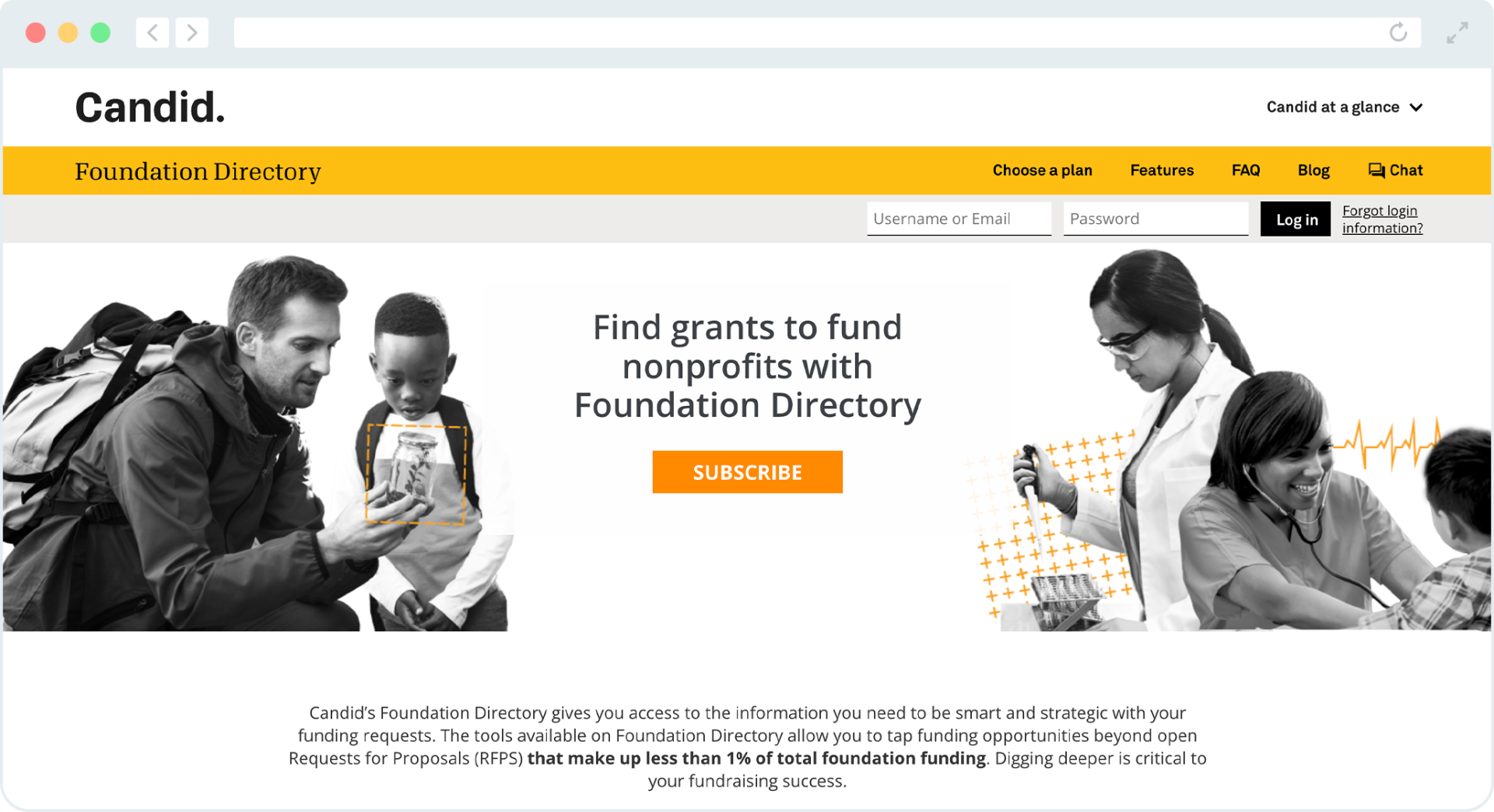
Candid’s Foundation Directory is primarily meant for registered 501(c)(3) organizations and unregistered nonprofits with fiscal sponsors. These groups can use the directory to search for grants based on:
- Subject
- Location
- Grantmaker type
- Type of support
- Trustee names
The Foundation Directory is ultimately a search tool for nonprofits interested in finding grants relevant to their cause. Candid’s data visualization tools also allow nonprofits to view giving trends and assess whether a specific grantmaker is likely to fund their organization.
Costs
Candid has Enterprise, Professional, and Essential plans available. Foundations, academic institutions, and large organizations are encouraged to explore custom-priced Enterprise plans, but other nonprofits can jump right into Candid via the Professional plan ($133.25 per month) or the Essential plan ($37.42 per month).
2. Grants.gov
Overview
Grants.gov is the United States government’s main resource for organizations seeking federal grant funding. Grants.gov is specifically for United States-based organizations, including nonprofits, educational institutions, Native American organizations, city governments, and small businesses. There are even a few grants individuals can apply to.
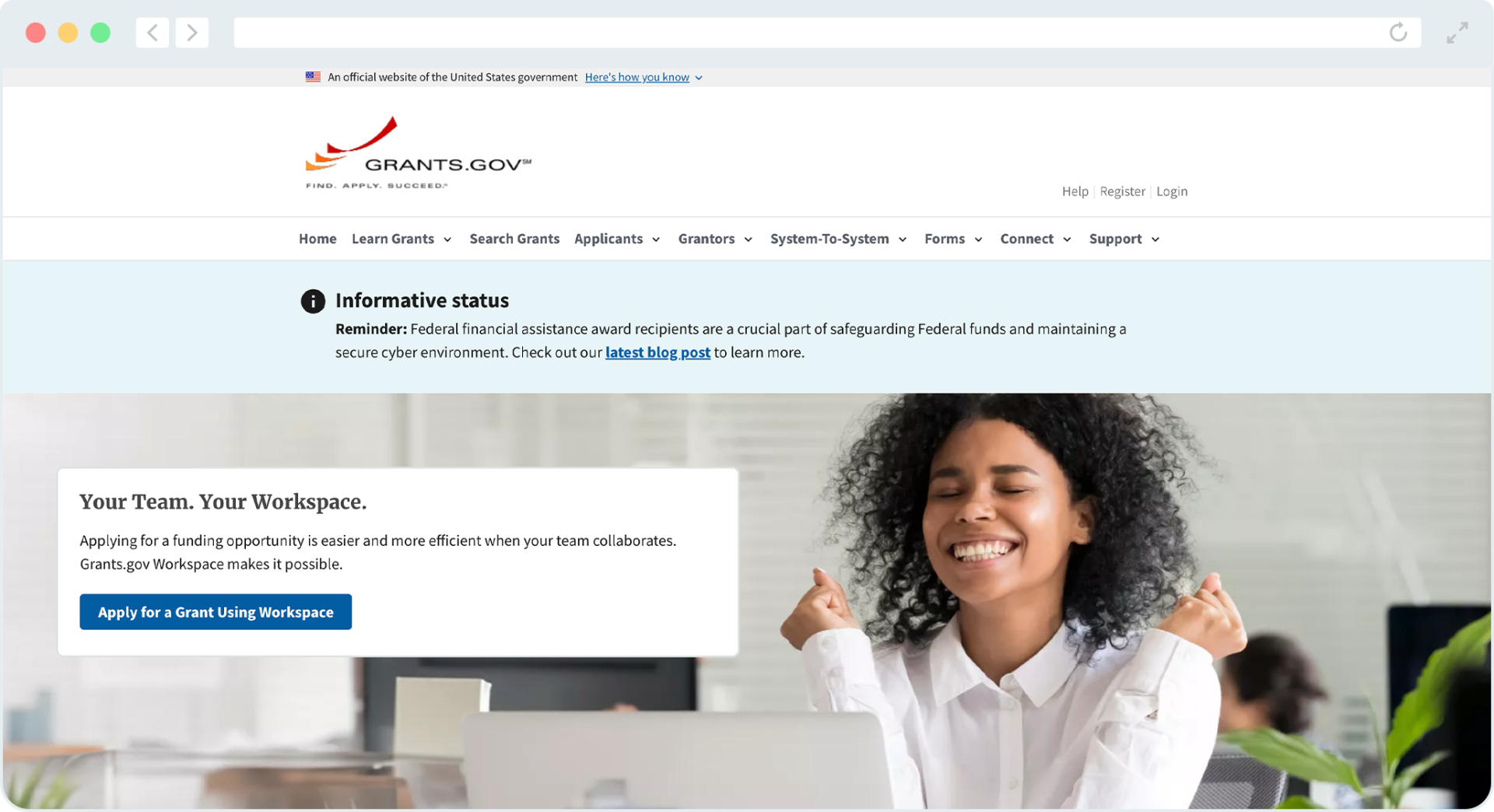
The main draw to Grants.gov, of course, is the ability to discover government-backed grants. Organizations looking to apply for a government grant should use this database like they would other grant research tools and narrow their search to the most relevant opportunities. Once you discover a grant that fits your organization, you can hit the red “Apply” button in the top right corner of each grant’s information page to begin your application.
Along with the searchable database, Grants.gov also has a wealth of information on grants in general, including basics on grant terminology, eligibility requirements, fraud, and even career development in the grant space.
Costs
Organizations can sign up with Grants.gov for free. However, there are multiple steps to take before completing their registration. Specifically, nonprofits must register their organization at SAM.gov, the United States registry for organizations that do business with the federal government. Registering for SAM.gov is also free.
Signing up with SAM.gov takes an average of 7-10 business days, after which you will receive a Unique Entity Identifier (UEI) that you can use to sign up for Grants.gov. Nonprofits will need to renew their registration with SAM.gov annually.
3. GrantStation
Overview
GrantStation is a grant database that contains grants from the following types of organizations:
- Independent, family, community, and corporate foundations
- Corporations
- Faith-based grantmakers
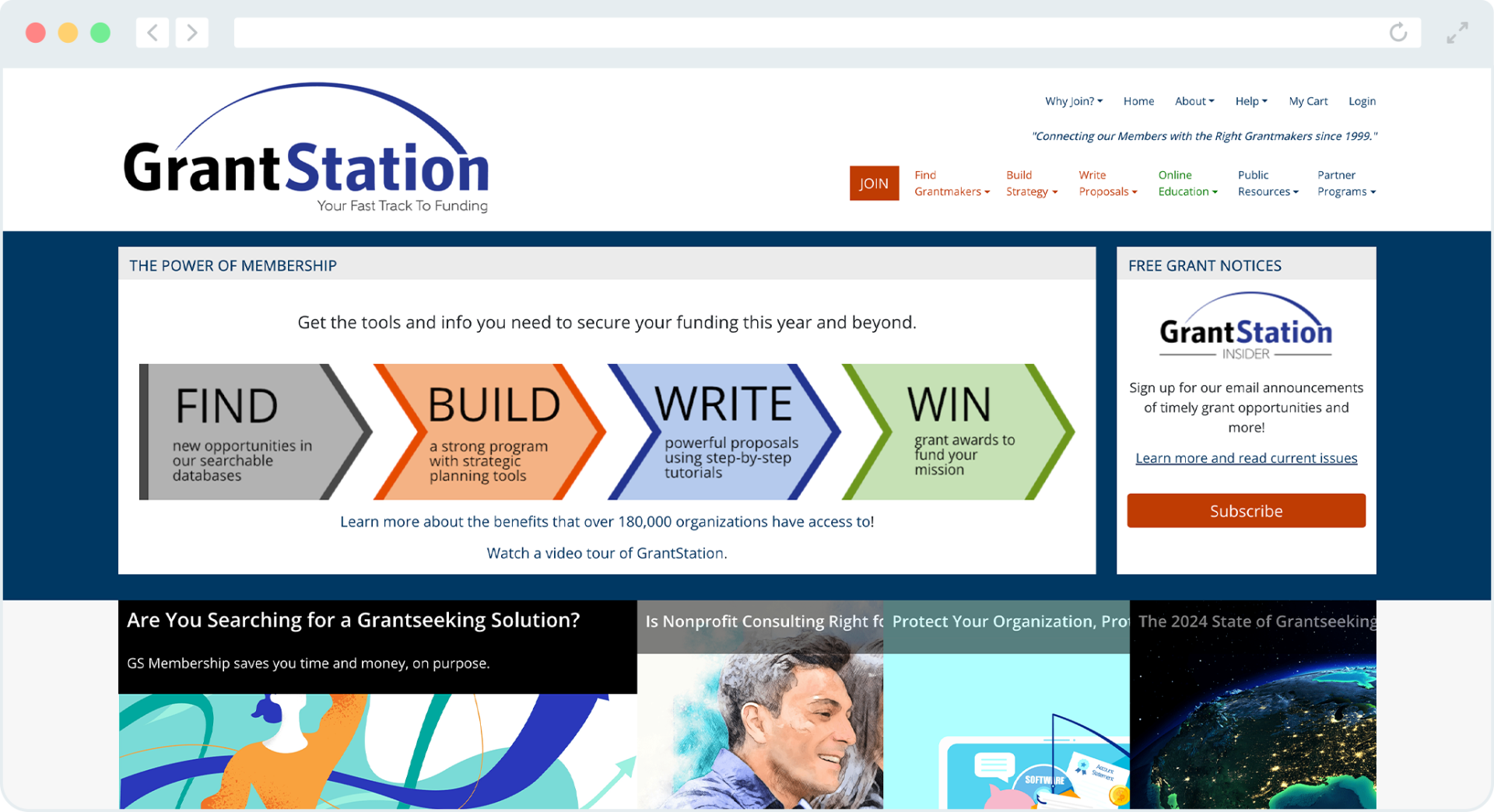
Additionally, GrantStation includes grants from U.S. federal and state governments as well as Canadian government grants and some international grants. GrantStation encourages users to select their specific country and state and then enter several terms related to their cause to narrow their search results.
GrantStation also offers several resources related to grant writing, such as examples of past winning proposals, a grants calendar, and grant-related webinars. Some of these resources are available for free while others require a membership.
Costs
Organizations signing up for access to GrantStation’s database can choose between a one-year $179 membership or a two-year $249 membership. GrantStation also offers a newsletter with grant resources that nonprofits can subscribe to for free.
4. Instrumentl
Overview
Instrumentl is a grant management and research tool for nonprofit organizations and grant writing consultants. Nonprofits can use Instrumentl to find, track, and apply for grants, while grant writers can use it as a tool for managing the various grants they are writing for clients.
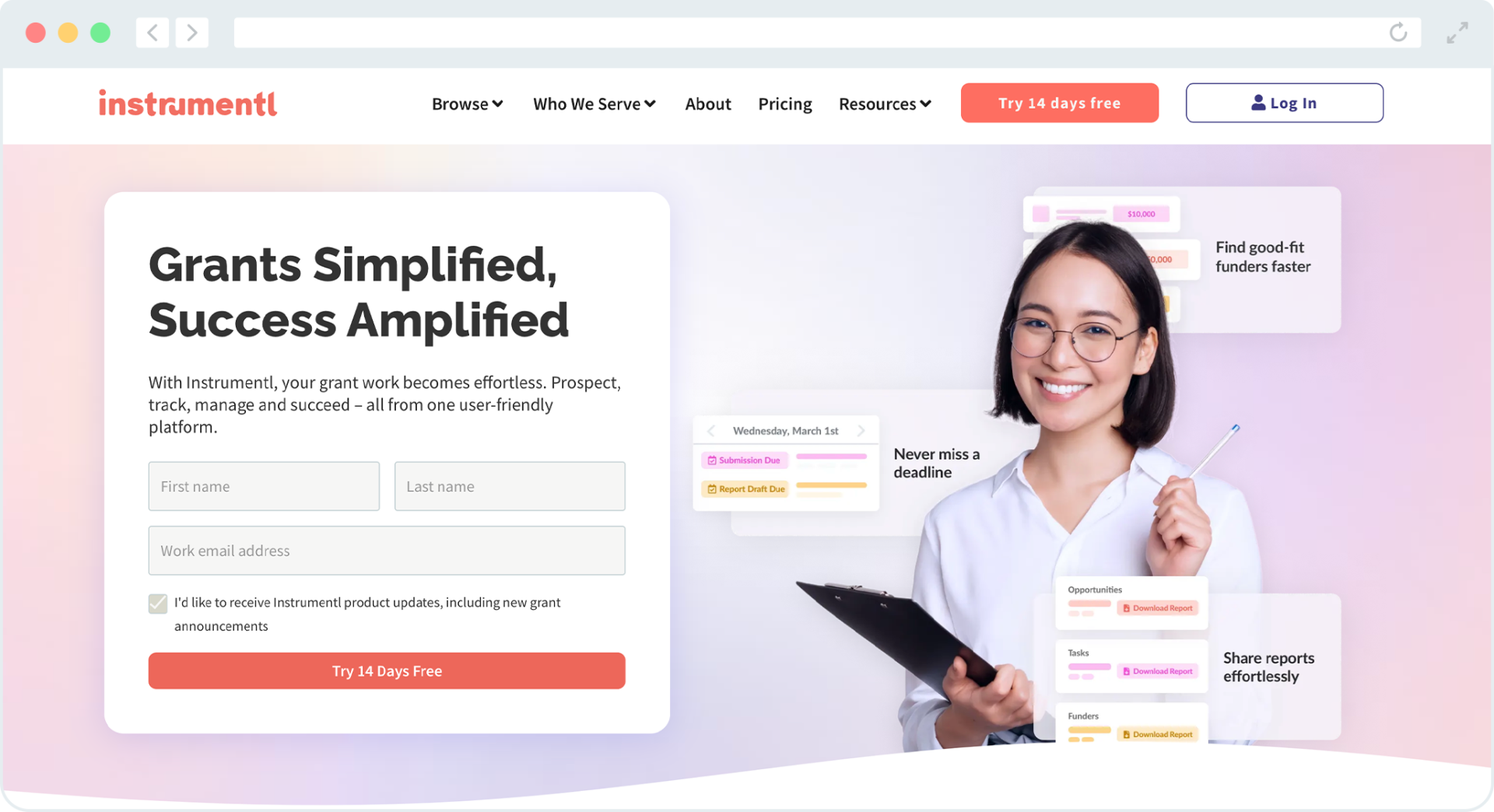
For each grant opportunity listed in Instrumentl, users can click in and see an overview of the specific grant and a detailed breakdown of the grantmaker’s 990 report. While nonprofits can find 990s themselves with enough research, Instrumentl displays the information in a user-friendly format, allowing users to easily discover grantmakers’ total assets, total giving, giving per year, contact information, and which organizations have received previous grants.
Instrumentl also aims to help nonprofits navigate one of the most common hurdles in finding grant opportunities: discovering and making contact with invite-only grantmakers. These grantmakers only allow select organizations to apply for their grants and often lack a web presence, making introducing your nonprofit and building a relationship a challenge.
Instrumentl provides invite-only grant organizations’ contact information, as well as their history of past grant recipients. This allows nonprofits to better assess their networks to determine if they have an in with these exclusive grantmakers and begin building a relationship.
Costs
Instrumentl offers access to its grant management tools and full grant database at three price points depending on your organization’s size and level of need. Nonprofits can also sign up for a 14-day free trial to see if Instrumentl is right for them before subscribing.
5. GrantScape
Overview
Finding and applying for grants are only the first steps to an effective grant management strategy. To avoid penalties and receive future funding, nonprofits also need to maintain grant compliance. For nonprofits looking for assistance managing their grants, GrantScape is a grant database powered by the grant compliance experts at Thompson Grants.
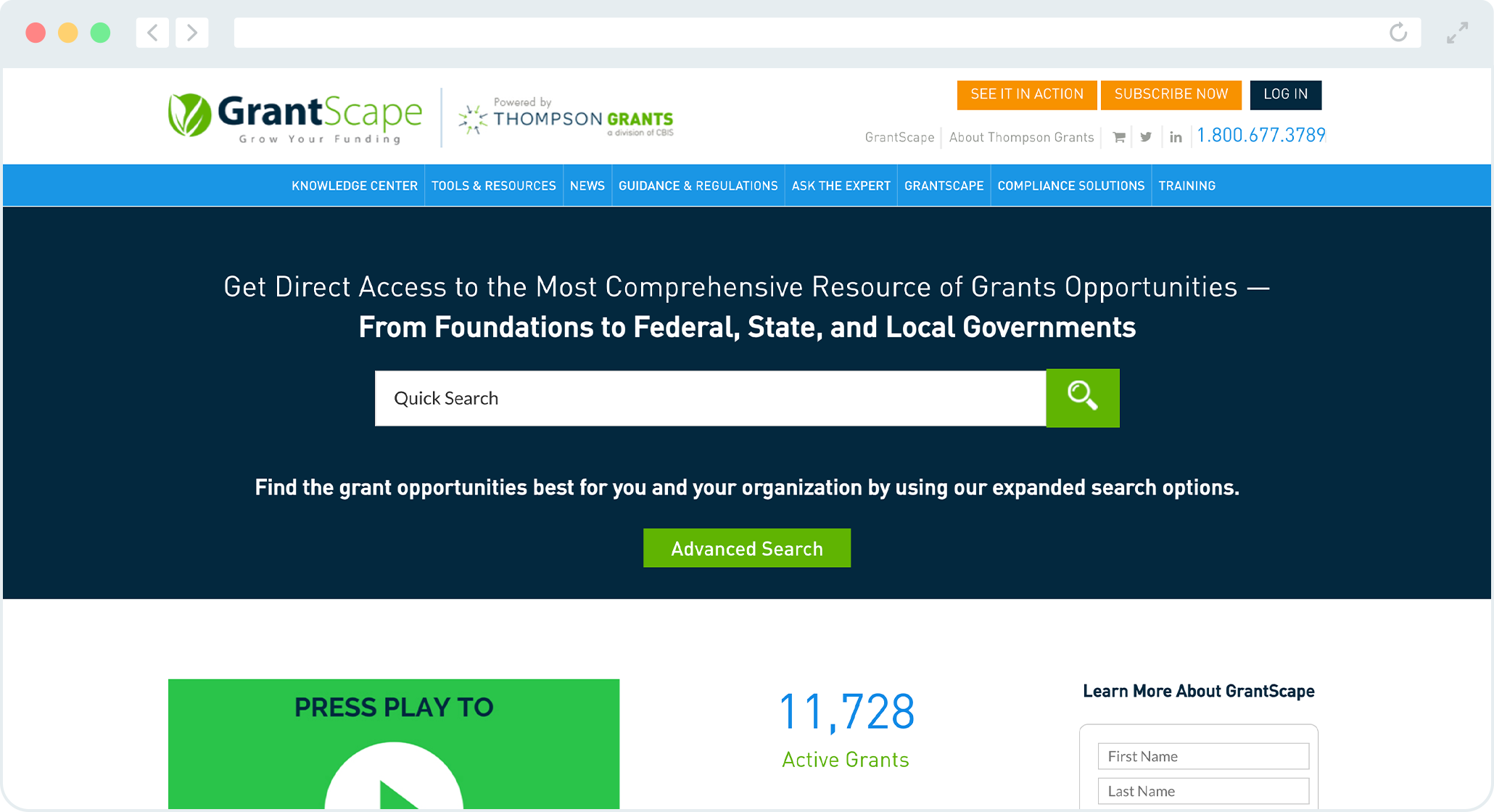
GrantScape provides subscribers with access to its comprehensive database of more than 11,000 grant opportunities from foundations and government agencies. Additionally, subscribers can access GrantScape’s “knowledge center,” which provides online modules dedicated to various aspects of the grant process. With backing from Thompson Grants, these modules discuss complex legal parts of grant management, such as how to handle grant expenditures, monitor federal subawards, and understand audit law and policy.
Plus, to make sure you know how to use the grant database to its maximum potential, GrantScape provides new users with a 30-minute consultation to answer questions and provide tips for effective grant research strategies.
Costs
Users have the option to subscribe just to GrantScape or get a package deal that includes GrantScape database access by signing up with Thompson Grants. Nonprofits interested solely in the GrantScape database can purchase access at a monthly or annual rate. In contrast, those interested in training rather than a database alone can subscribe to Thompson Grants’ webinar training pass to attend grant-related webinars and subscriber events.
6. GrantForward
Overview
Universities and colleges need specialized grant databases focused on academic funding and research opportunities. Higher education institutions can find what they’re looking for with GrantForward.
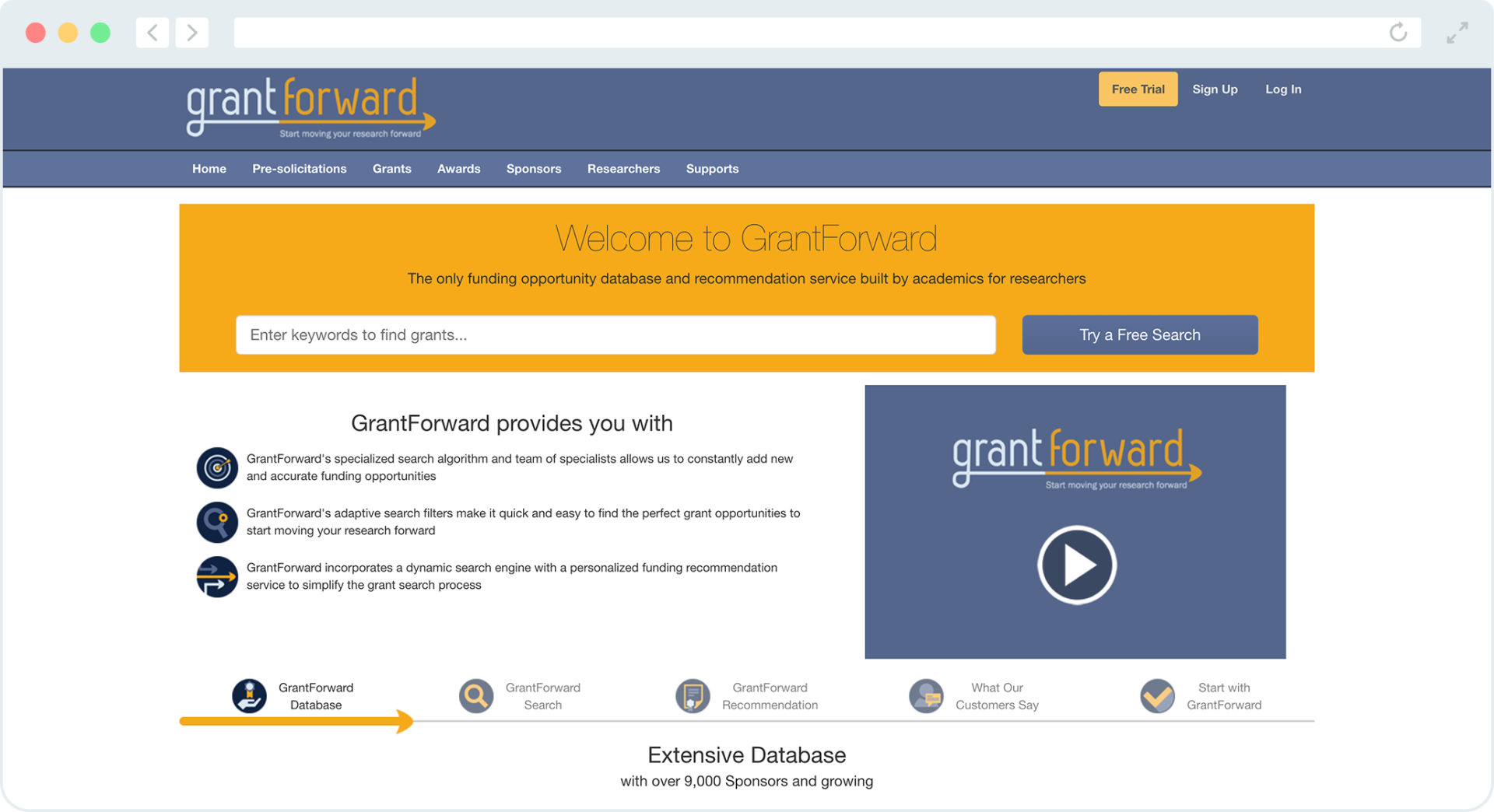
GrantForward has a database of over 63,000 grants for researchers. To avoid getting overwhelmed, researchers at your institution can also create individual profiles on GrantForward that state their field of study and research interests. Then, GrantForward will recommend funding opportunities that fit their profiles.
To help train everyone at your higher education institution to use the database, GrantForward provides instructional tools that universities can share with researchers as well as resources for how to roll out GrantForward’s grant research tools to your team.
Costs
The price to access GrantForward is determined by institution size. Contact their team to receive a detailed pricing plan.
7. National Endowment for the Humanities
Overview
Government grants can be divided based on the agency or department funding them. One notable organization to discuss is the National Endowment for the Humanities (NEH). NEH is an independent federal government agency and one of the largest funders of humanities programs in the United States.
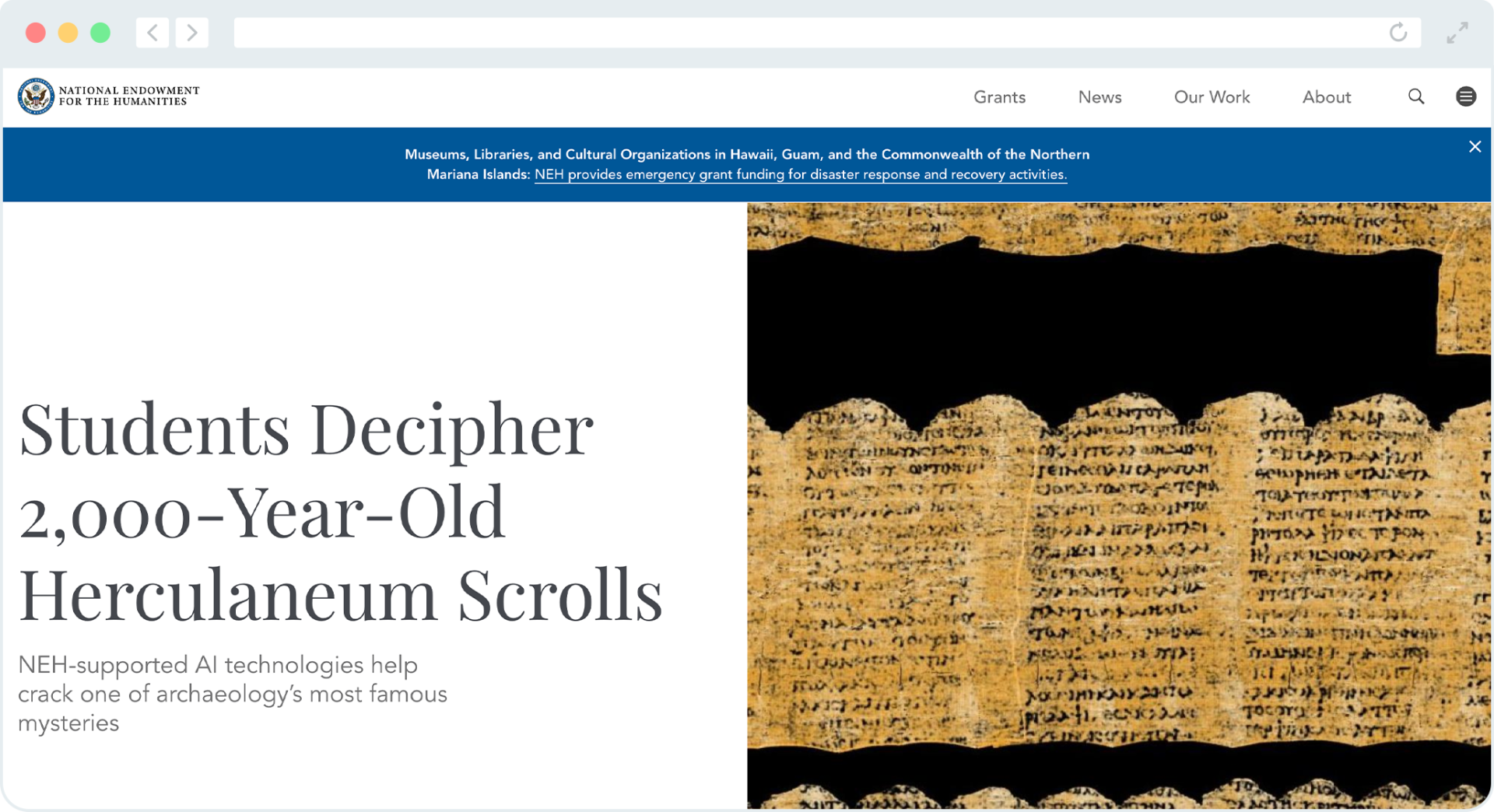
NEH grants typically are awarded to:
- Museums
- Archives and libraries
- Higher education institutions
- Public television
- Radio stations
- Individual scholars
The available grants also range widely in specificity from a fellowship for social science research in Japan to a grant meant for strengthening universities’ humanities programs. Each grant has a unique application process that can be explored through Grants.gov.
Costs
NEH is essentially an offshoot of Grants.gov and has the same sign-up requirements and no extra costs.
8. Catholic Funding Guide
Overview
Religious-based nonprofits sometimes struggle to find grants they are eligible for. Fortunately, Catholic organizations and grantmakers alike have the Catholic Funding Guide to connect with one another.
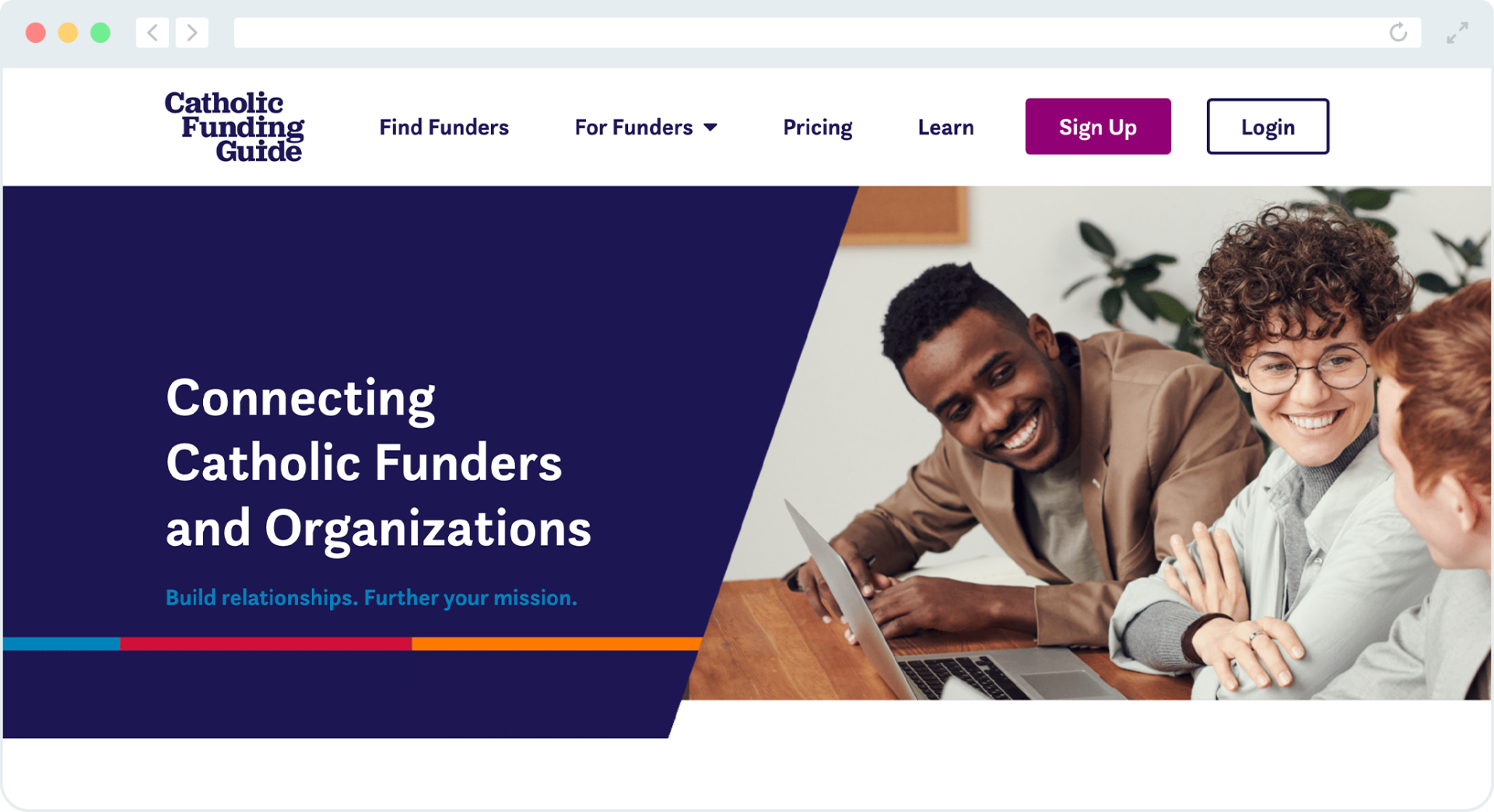
Using highly specialized grant databases like the Catholic Funding Guide can help your nonprofit instantly find more grants that are relevant to your cause. Organizations using the Catholic Funding Guide already start off knowing funders are interested in their organization type and can then further refine their search based on interest area, geographic location, funding amount, and more.
Along with helping grantees find funding, the Catholic Funding Guide helps grantmakers find potential grantees. With the Amplify feature, grantees can create posts about their projects. Then, grantmakers can review proposals and reach out to nonprofits about projects they want to fund.
Costs
Interested Catholic organizations can sign up for either the Standard $229 annual or the Professional $299 annual plans.
9. Local Government Resources
Overview
Sometimes one of the best places to look for grant resources is your own backyard. Check your town, city, or county’s website for grant information. The number of resources and available grants will depend on the size and population makeup of your city.
For example, Atlanta, Georgia is such a strong supporter of the arts that art-related grants have an entire website dedicated to them.
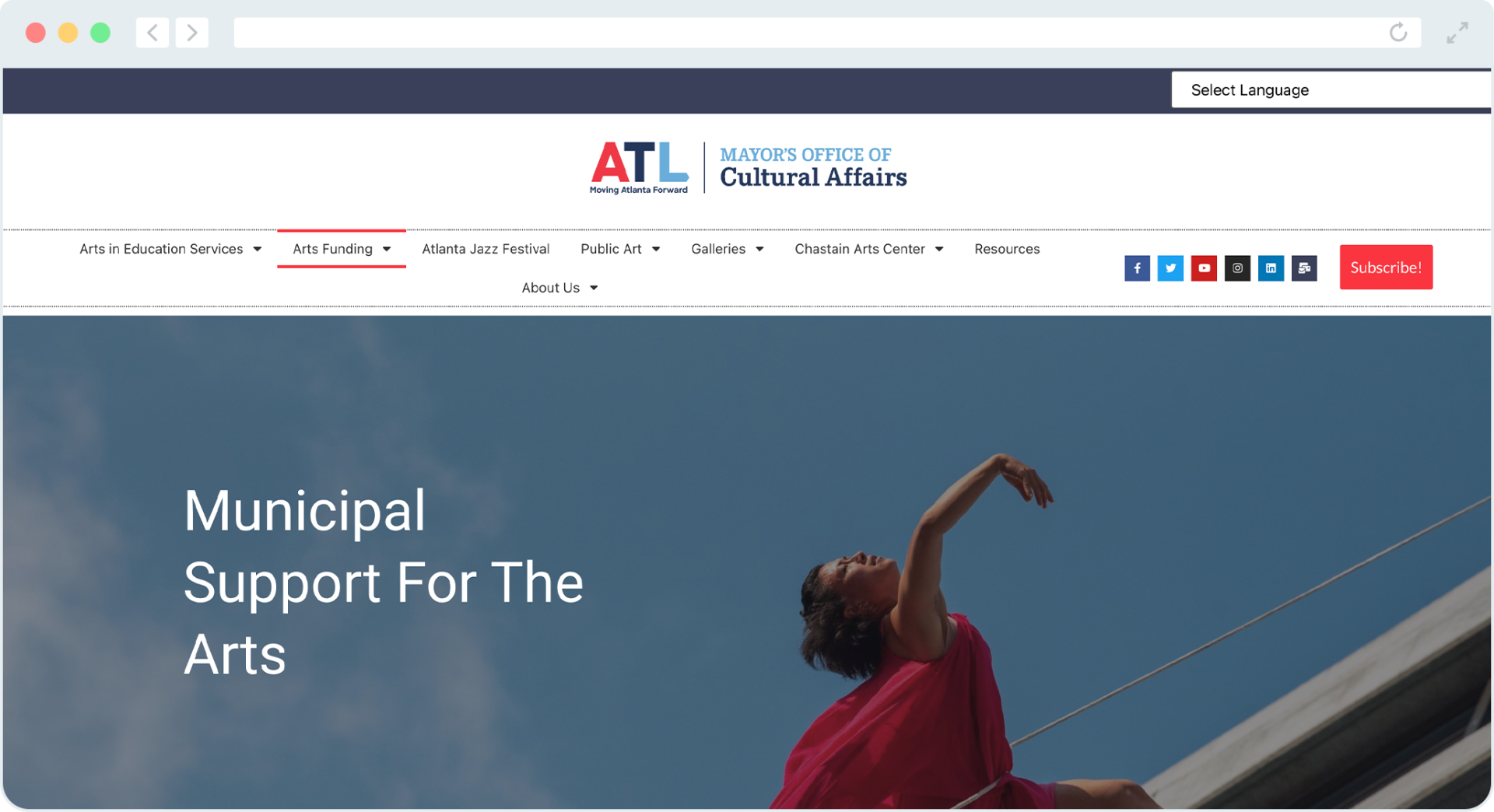
On the other hand, Portland, Oregon has a dedicated grant specifically for small organizations, allowing nonprofits of all types that support the community in some way to receive funding. Additionally, Pittsburgh, Pennsylvania has a special grant for emergency funding that only opens up when disasters hit the city.
Research your local government’s grant resources to see if there are opportunities that fit your nonprofit. If your organization is new to applying for grants, these smaller-scale grants are valuable opportunities in and of themselves and also useful stepping stones for earning larger grants. After all, federal grant applications are often long and detailed, so get practice in applying for a local grant to ensure you’re ready when the time comes to level up your grant strategy.
Costs
Just like with Grants.gov, your local government resources are most likely to be free. You may need to create an account or provide proof of your organization’s nonprofit status, but it’s unlikely there will be any fees.
10. Grantmakers.io
Overview
Not every grant database is a business designed for enterprise-size nonprofits. For instance, Grantmakers.io is a free grant database run by a one-man team. The site scans and formats foundations’ publicly available Form 990s. As a result, nonprofits can conveniently search through basic profiles for over 100,000 foundations.
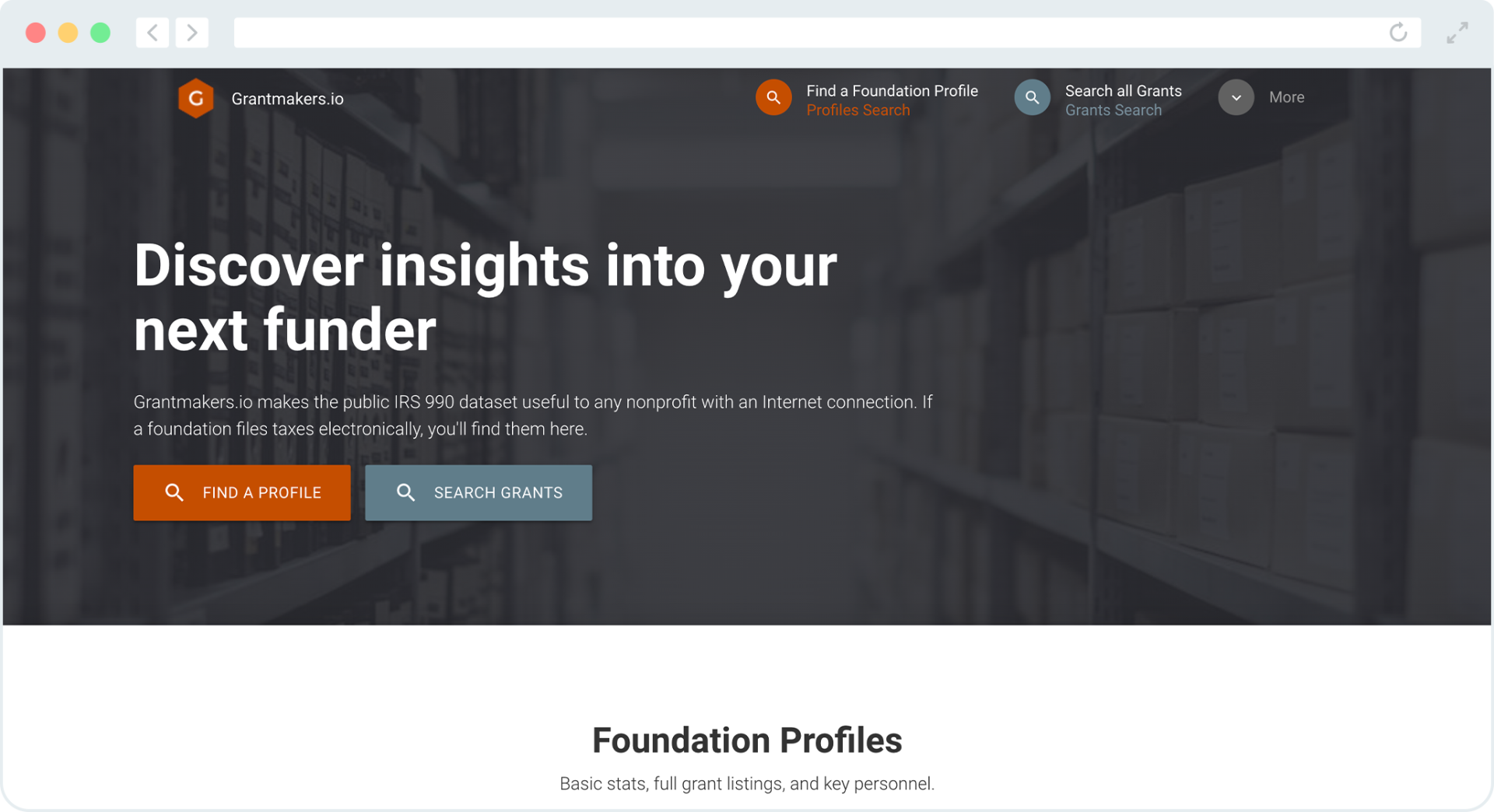
At a glance, each foundation has essential information displayed, including:
- Number of grants offered
- Average grant amount
- Whether the foundation has recently offered grants
- Whether the foundation has paid staff or is operated by volunteers
- The foundation’s website
- Whether the foundation potentially accepts unsolicited grant applications
- Total assets
In addition to foundations, users can also explore grant recipients. Seeing what organizations foundations are giving to and in what quantities can help set your nonprofit’s expectations when seeking grant funding. After all, if a foundation gives to many nonprofits similar to yours, then your grant proposal is more likely to align with their mission.
Costs
Grantmakers.io promises to be, in the website’s creator’s own words, “Free as in freedom and free as in food.” If you would like to, you can even donate to Grantmakers.io to help keep the content free and support the site.
More Grant Research Tools
Grant research tools are essential for helping your nonprofit find the funding opportunities you need to power your mission. Use grant databases that fit your budget and contain information on the types of grant funding relevant to your nonprofit.
However, keep in mind that there’s more to grants than just receiving funding through foundations and government programs. To discover other types of grants your nonprofit can tap into now, explore these resources:
- Corporate Volunteer Grant Programs: Learn the Basics. Volunteer grants are a special type of grant that your supporters can start earning for your nonprofit right now. Discover how to take advantage of these grants.
- Matching Gift Databases: What Nonprofits Should Know in 2024. Explore how matching gift databases work and what your nonprofit needs to know before investing in this type of grant research tool.
- Google Grants Eligibility: How to Check Yours & Get Started. Interested in a marketing grant that’s open to almost all nonprofits? Check out whether you’re eligible for the Google Ad Grant.
